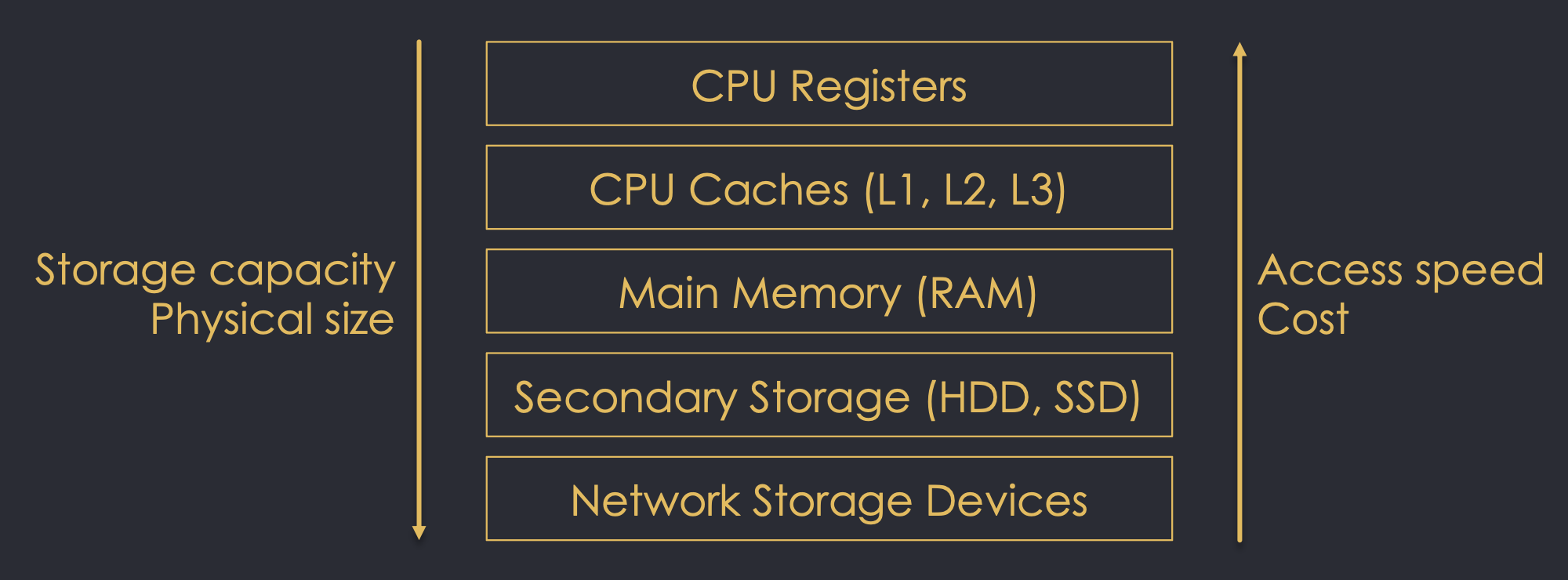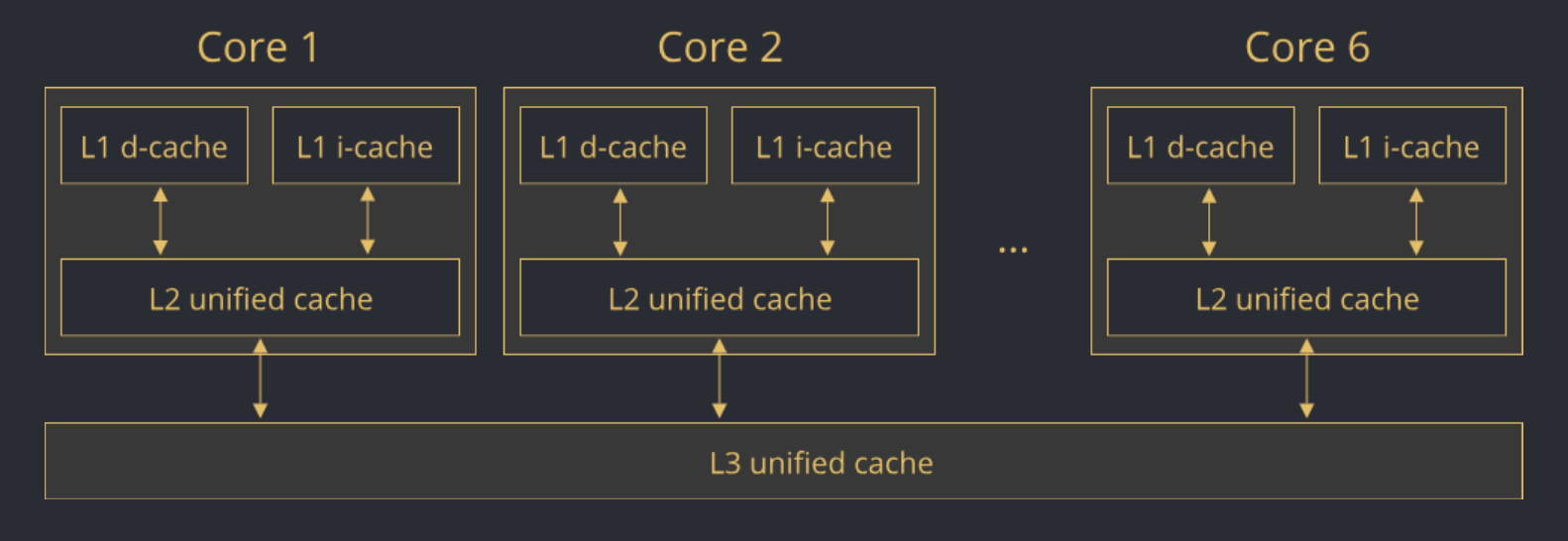Memory Management 1
Memory + Static Type Systems
Why do modern computers have different types of memory?
The Memory Hierarchy
- Memory differs in size, access speed, physical location and cost
- Memory forms a hierarchy:

Caches
- Caches are storage buffers for frequently / recently used memory

Memory meets Physics
- Question 1: On a 3 GHz CPU, how much time does a single CPU cycle take?
- Question 2: Assume information travels at the speed of light and you want to read a byte from RAM, process it with a single instruction, and write it back to RAM at 3 GHz. What is the maximum distance between CPU and Memory that is physically possible?
Memory Size and Latency
- Memory that is arbitrarily large and arbitrarily fast is impossible: These two factors are mutually exclusive!
| Memory Type | Typical Size | Typical access time | |
|---|---|---|---|
| Register | A few bytes | One CPU cycle (less than a nanosecond) | |
| L1 Cache | Dozens of KiBs | A few CPU cycles (about a nanosecond) | |
| L2 Cache | Hundreds of KiBs | ~10ns | |
| L3 Cache | A few MiBs | 20-40ns | |
| Main Memory | GiBs | 100-300ns | |
| SSD | TiBs | A few hundred microseconds | |
| HDD | Dozens of TiBs | A few milliseconds | |
| Network Storage | Up to Exabytes | Hundreds of milliseconds to seconds |
The Stack (recap)
- Special memory region & data structure for handling subroutine calls (i.e. functions)
- Needed for:
- Local variables
- Large arguments (that don’t fit in registers)
- One advantage of higher level languages: Automatic stack management
Scopes
- The region in the code where a given variable is valid is called the scope of that variable
- C, C++, and Rust use curly braces {} to define scopes
Scopes and the stack
- How does the stack look like in line 3? And in line 10?
Stack memory is managed by the compiler!
- No need to write manual
pushandpopstatements - This is a form of automatic memory management!
- It has no overhead compared to manually writing
pushandpop(if your compiler is smart)
- It has no overhead compared to manually writing
- Downsides:
- Stack size is limited (usually a few MiB)
- Stack memory is strictly hierarchical
- Allocations on the stack have to be know at compile time
Limitations of the stack
fn main() {
let mut input = String::new();
let mut numbers = ???;
loop {
println!("Insert a number or leave empty to finish:");
std::io::stdin().read_line(&mut input)
.expect("Failed to read input");
if input.is_empty_or_whitespace() {
break;
}
let number = input.parse::<i32>().expect("invalid value");
numbers.push(number);
}
numbers.sort();
println!("{numbers}");
}Limitations of the stack
fn main() {
let mut input = String::new();
let mut numbers = ???;
loop {
println!("Insert a number or leave empty to finish:");
std::io::stdin().read_line(&mut input)
.expect("Failed to read input");
if input.is_empty_or_whitespace() {
break;
}
let number = input.parse::<i32>().expect("invalid value");
numbers.push(number);
}
numbers.sort();
println!("{numbers}");
}- How many numbers will there be?
- How big will the
Stringbe?
Stack-only code is possible
const MAX_STRING_LEN: usize = 256;
const MAX_NUMBERS: usize = 128;
fn stoi(bytes: &[u8]) -> i32 { todo!() }
fn main() {
let mut input: [u8; _] = [0; MAX_STRING_LEN];
let mut input_size: usize = 0;
let mut numbers: [i32; _] = [0; MAX_NUMBERS];
let mut numbers_size: usize = 0;
loop {
println!("Insert a number or leave empty to finish:");
input_size = std::io::stdin()
.read(&mut input)
.expect("Failed to read input");
if input_size == 0 {
break;
}
let number = stoi(&input[..input_size]);
numbers[numbers_size] = number;
numbers_size += 1;
}
numbers.sort();
println!("{:?}", &numbers[..numbers_size]);
}- Your task (in groups): Find as many things as you can that are wrong with this code!
- You can use LLMs, but group into “problems I understand” and “problems I don’t understand”
- 10 minutes
Dynamic memory allocations
- We need growable arrays:
fn main() {
let mut input = String::new();
let mut numbers = Vec::new();
loop {
println!("Insert a number or leave empty to finish:");
std::io::stdin().read_line(&mut input)
.expect("Failed to read input");
if input.is_empty_or_whitespace() {
break;
}
let number = input.parse::<i32>().expect("invalid value");
numbers.push(number);
}
numbers.sort();
println!("{numbers}");
}A look into Vec<T>
Vec<T>(orstd::vector<T>in C++) manages a dynamic piece of memory- The allocation is dynamic: It happens on-demand
- The size is dynamic: It can grow and shrink
Open questions
- How is memory allocated?
- How is it freed? When is it freed?
- How do uninitialized elements work?
- What happens if the memory on the heap is full?
Open questions
- How is memory allocated? -> unsafe Rust
- How is it freed? When is it freed? -> RAII
- How do uninitialized elements work? -> unsafe Rust
- What happens if the memory on the heap is full? -> unsafe Rust
Automatic deallocation?
numbersgoes out of scope at the end of main- This cleans up the stack memory. What about the heap?
fn main() {
let mut input = String::new();
let mut numbers = Vec::new();
loop {
println!("Insert a number or leave empty to finish:");
std::io::stdin().read_line(&mut input)
.expect("Failed to read input");
if input.is_empty_or_whitespace() {
break;
}
let number = input.parse::<i32>().expect("invalid value");
numbers.push(number); // Will allocate
}
numbers.sort();
println!("{numbers}");
}The Drop trait - Destructors in Rust
- Tell the Rust compiler: “Call this function when an instance of this type goes out of scope!”
- Allows us to clean up more than just the stack memory
- Mandatory whenever we write a type that owns a resource:
Vec<T>owns a dynamic array on the heapStringalso owns a dynamic array (of UTF-8 bytes) on the heapFileowns a file handle from the OS
The Drop trait - Example
The Drop trait - Example
- Compiler inserts the
dropcall - Now we can never forget to call
free/deleteanymore!
RAII
- This is called resource acquisition is initialization (RAII)
- Terrible name for an amazing concept
- Better name: Scoped-based resource management
- Acquire a resource during initialization of the type
- Release the resource during destruction of the type
Is it really that simple?
Is it really that simple?
borrow of moved value: `numbers`Semantics
- What does it mean to pass a value into a function?
print_numbers(numbers)
- How does the function get access to the value?
- The CPU only knows bytes…
- Depends on the semantics of the programming language
- Semantics: The study of meaning in languages
Passing values to functions
- We have three options:
- Copy
- Move
- Indirection (i.e. pointers)
Rust has move-semantics
- Rust moves values on assignment and function call
- A moved-from value becomes invalid
- Why would we choose move-by-default?
Indirection by default?
A problem with copies
Copying resource owners
- We can fix our issues by doing a deep copy
- How is that performance-wise?
- What if an element on the heap is another resource-owner?
- How deep does a deep copy have to be?
Performance tradeoff
- Copy-by-default:
- Hidden performance hits possible
- Straightforward, doesn’t “steal” anything
- Move-by-default:
- Best performance
- Transfers ownership (unusual?)
- Indirection:
- On primitive types: Overkill
- On large resource owners: Good
Primitive types and move
- Does this code compile?
- It does, but why?
The Copy trait
- A move has no direct equivalent on the hardware level
- It can be a copy
- The copy can be elided (e.g. return values)
- Registers might be reused for efficiency
- Primitive types always fit into registers
- This makes them cheap to copy
- Rust has a marker trait called
Copyfor types that support bitwise copies- All primitive types implement
Copy
- All primitive types implement
Copy turns moves into copies
Who can implement Copy?
- Only fully self-contained types
- No indirection!
- The whole value of the type must live entirely on the stack
- What if we want deep copies instead?
Manually copying with the Clone trait
- We use the
Clonetrait!
Copy, Clone, moving and pinning
Come up with a Copy + Clone type, a Clone type, and a move-only type
Work in groups, duplicated types cancel out!
- From growable arrays to their limitations:
- Don’t forget to clean up memory (leads to RAII)
- Indirection / resource ownership changes value semantics (leads to Copy, Clone, move-by-default)